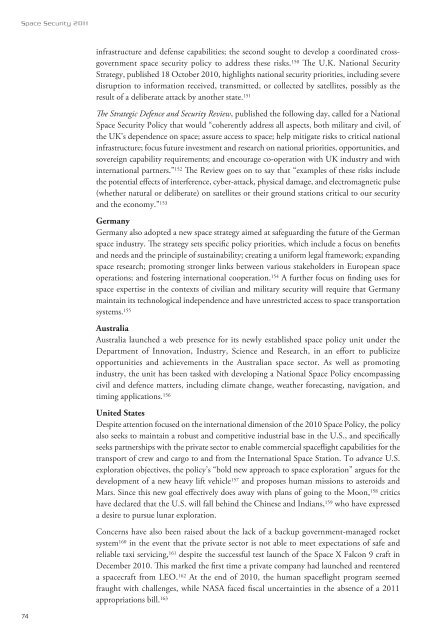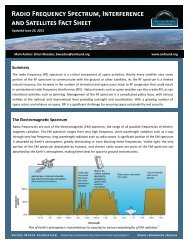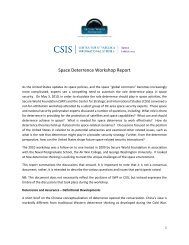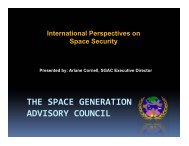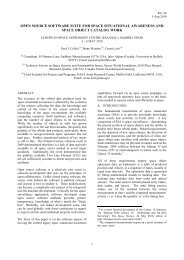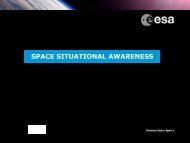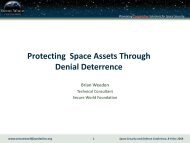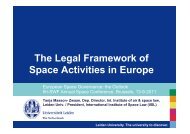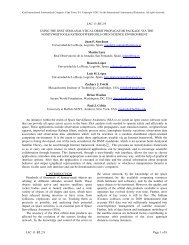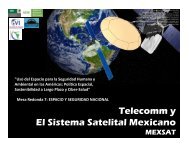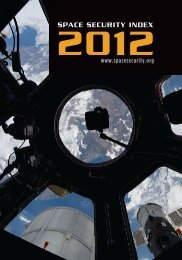Space Security Index
Space Security Index
Space Security Index
Create successful ePaper yourself
Turn your PDF publications into a flip-book with our unique Google optimized e-Paper software.
<strong>Space</strong> <strong>Security</strong> 2011<br />
74<br />
infrastructure and defense capabilities; the second sought to develop a coordinated crossgovernment<br />
space security policy to address these risks. 150 e U.K. National <strong>Security</strong><br />
Strategy, published 18 October 2010, highlights national security priorities, including severe<br />
disruption to information received, transmitted, or collected by satellites, possibly as the<br />
result of a deliberate attack by another state. 151<br />
e Strategic Defence and <strong>Security</strong> Review, published the following day, called for a National<br />
<strong>Space</strong> <strong>Security</strong> Policy that would “coherently address all aspects, both military and civil, of<br />
the UK’s dependence on space; assure access to space; help mitigate risks to critical national<br />
infrastructure; focus future investment and research on national priorities, opportunities, and<br />
sovereign capability requirements; and encourage co-operation with UK industry and with<br />
international partners.” 152 e Review goes on to say that “examples of these risks include<br />
the potential eects of interference, cyber-attack, physical damage, and electromagnetic pulse<br />
(whether natural or deliberate) on satellites or their ground stations critical to our security<br />
and the economy.” 153<br />
Germany<br />
Germany also adopted a new space strategy aimed at safeguarding the future of the German<br />
space industry. e strategy sets specic policy priorities, which include a focus on benets<br />
and needs and the principle of sustainability; creating a uniform legal framework; expanding<br />
space research; promoting stronger links between various stakeholders in European space<br />
operations; and fostering international cooperation. 154 A further focus on nding uses for<br />
space expertise in the contexts of civilian and military security will require that Germany<br />
maintain its technological independence and have unrestricted access to space transportation<br />
systems. 155<br />
Australia<br />
Australia launched a web presence for its newly established space policy unit under the<br />
Department of Innovation, Industry, Science and Research, in an eort to publicize<br />
opportunities and achievements in the Australian space sector. As well as promoting<br />
industry, the unit has been tasked with developing a National <strong>Space</strong> Policy encompassing<br />
civil and defence matters, including climate change, weather forecasting, navigation, and<br />
timing applications. 156<br />
United States<br />
Despite attention focused on the international dimension of the 2010 <strong>Space</strong> Policy, the policy<br />
also seeks to maintain a robust and competitive industrial base in the U.S., and specically<br />
seeks partnerships with the private sector to enable commercial spaceight capabilities for the<br />
transport of crew and cargo to and from the International <strong>Space</strong> Station. To advance U.S.<br />
exploration objectives, the policy’s “bold new approach to space exploration” argues for the<br />
development of a new heavy lift vehicle 157 and proposes human missions to asteroids and<br />
Mars. Since this new goal eectively does away with plans of going to the Moon, 158 critics<br />
have declared that the U.S. will fall behind the Chinese and Indians, 159 who have expressed<br />
a desire to pursue lunar exploration.<br />
Concerns have also been raised about the lack of a backup government-managed rocket<br />
system 160 in the event that the private sector is not able to meet expectations of safe and<br />
reliable taxi servicing, 161 despite the successful test launch of the <strong>Space</strong> X Falcon 9 craft in<br />
December 2010. is marked the rst time a private company had launched and reentered<br />
a spacecraft from LEO. 162 At the end of 2010, the human spaceight program seemed<br />
fraught with challenges, while NASA faced scal uncertainties in the absence of a 2011<br />
appropriations bill. 163


